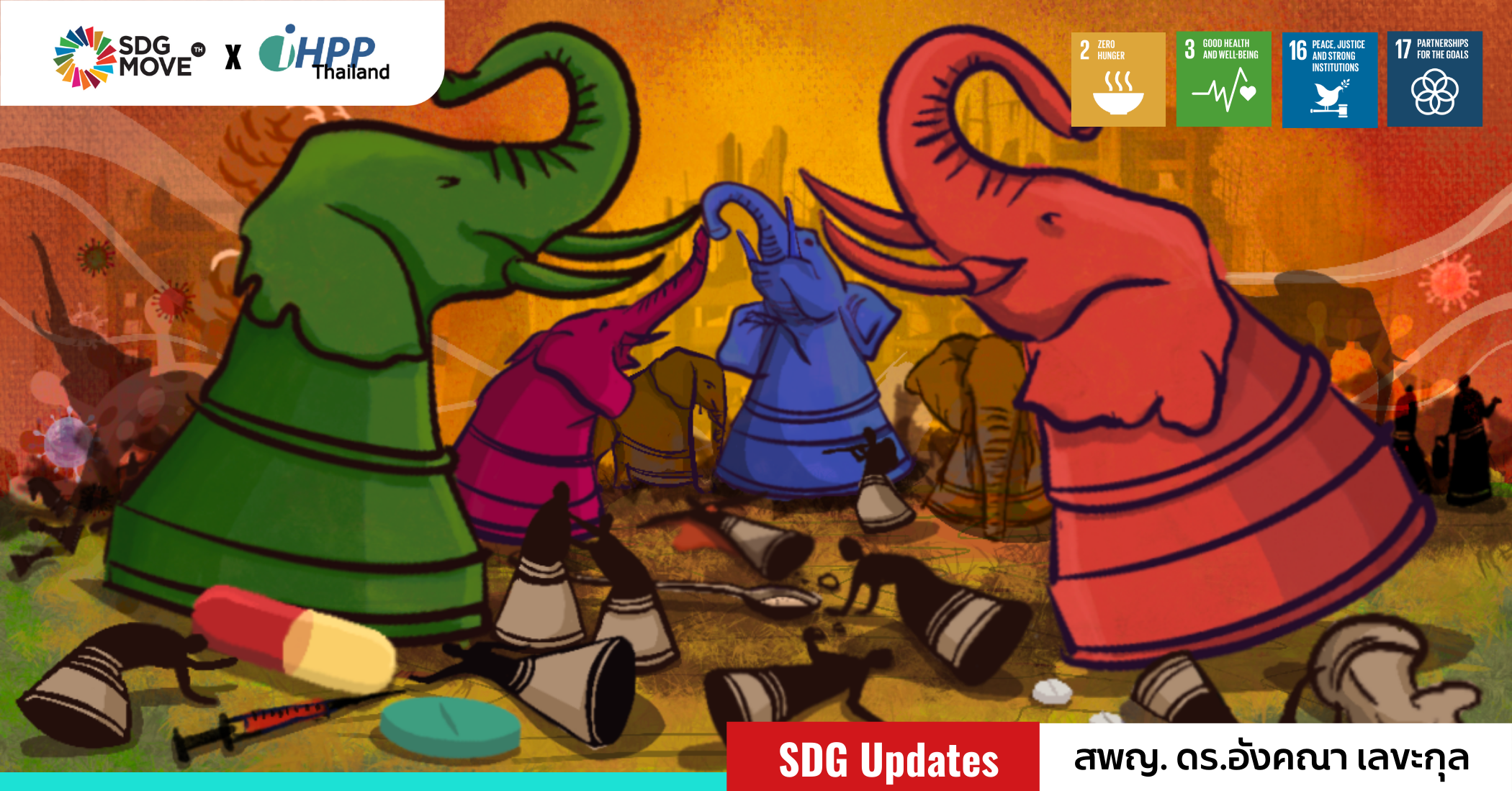Dr Angkana Lekagul
Researcher, Sustainable One Health Development Program, International Health Policy Program, Ministry of Public Health, Thailand
The complex interplay between global health and geopolitics has become a topic of increasing interest among academia worldwide. This growing appeal reveals how the dynamics of international relations directly affect health equity. This intricate relationship was thoroughly explored at the Prince Mahidol Award Conference (PMAC)[1] in 2024, held in Bangkok, Thailand, under the theme “Geopolitics and Health Equity in an Era of Polycrises.” Since its establishment in 2007, the conference has been a platform for addressing global health issues. PMAC is co-hosted by the Prince Mahidol Award Foundation,the Thai Government, and other international partners such as World Health Organization, the World Bank, USAID, JICA, the Rockefeller Foundation, the China Medical Board (CMB), and various UN agencies, symbolizing a hub of cooperation and dialogue in global health.
Geopolitics and Health Equity in an Era of Polycrises
The discussions at PMAC 2024 focused on navigating conflict challenges to enhance global health through three key areas:
- Addressing Power Imbalances: Advocating for a paradigm shift from competition towards collaborative efforts in tackling common health challenges, and emphasizing the role of global governance mechanisms in fostering health equity.
- Addressing Knowledge Imbalances: Promoting the decolonization of knowledge to support research that benefits all nations equally, prioritizing local knowledge generation and utilization, and advocating for reevaluating global university rankings to emphasize social impact.
- Addressing Economic Imbalances: Emphasizing the need for sustainable and equitable financial resources to achieve global health equity, focusing on supporting developing countries.
These focuses aim to bridge the gaps that geopolitics often widens, highlighting the interconnectedness of health equity and global solidarity.
Amid the Changing Landscape of Global Power, How is Health Affected?
The changing global power landscape significantly affects health beyond the direct casualties. International conflicts lead to widespread disruptions in healthcare services, from vaccination campaigns to preventing non-communicable diseases, besides providing adequate maternal and child healthcare. Epidemics during war worsen the situation, with public health officials often unable to control disease outbreaks. Notably, fragile areas affected by war are hotspots for outbreaks, with more than 70% of global outbreaks occurring in such regions.[2] The reemergence of polio in Pakistan and Afghanistan[3] illustrates the threatening health consequences of conflict.
Similarly, Yemen’s cholera outbreak from 2016 to 2022, the largest in history, has not only resulted in countless deaths but also highlighted the fragility of health systems in war-torn regions. The conflict has severely hampered access to clean water and sanitation, creating a breeding ground for cholera and other waterborne diseases. The healthcare infrastructure in Yemen has been destroyed, with hospitals bombed, medical supplies dwindling, and healthcare workers often working in dangerous conditions. The tragic situation in Yemen serves as a stark reminder of how geopolitical conflicts can devastate health systems and communities, making global solidarity and action more important than ever.
Moreover, over 114 million people have been displaced globally due to war and conflict,[4] facing uncertain futures and significant impacts on their mental health. The displacement leads to overcrowded living conditions in refugee camps and communities, with inadequate sanitation, further spreading communicable diseases. The challenges extend beyond immediate health concerns, affecting access to education and career development opportunities, which profoundly affect health and well-being. This brings to light the broader implications of geopolitical instability on global health, not just in immediate terms but also in shaping the future of societies and their well-being.
The Butterfly Effect: How Politics in Ukraine Makes Food More Expensive in Thailand
The extensive impact of conflict extends beyond healthcare, affecting various aspects of our lives, and highlighting the profound interconnectedness of our world. Troubles in one place, like the ongoing conflict in Ukraine, can have ripple effects that reach far and wide, even influencing something as seemingly unrelated as the price of instant noodles in Thailand.
Before the conflict, Russia and Ukraine played crucial roles in the global agricultural sector, notably in the production wheat,[5] barley,[6] and corn[7] and as major chemical fertilizer exporters. However, the onset of war disrupted the export of these commodities, directly impacting global food production costs. In Thailand, this disruption led to a significant increase in the price of instant noodles, with prices rising by 7 Baht per pack by mid-2022. The surge in instant noodle prices in Thailand exemplifies the broader economic impact of geopolitical tensions on global food prices, emphasizing the need for robust, resilient food supply chains capable of with disruptions.
Inefficient Global Mechanisms
Currently, there is growing scrutiny over global health governance mechanisms . Multilateral institutions including several UN agencies and the World Bank, which rely heavily on support by Western countries, are facing increasing questions regarding their effectiveness and equity. The WHO, for example, has become financially reliant on earmarked funding that dictates specific uses for these funds, while membership dues from member states contribute only a small fraction to its budget.[8] This financial dependency has limited WHO’s autonomy and raised questions about its role during health crises, notably its performance in distributing vaccines to low-income countries during the COVID-19 pandemic. The situation has sparked debates on whether WHO and similar institutions need comprehensive reform to better serve global health needs equitably and effectively.
This recognitionof our interconnectedness, highlighted by the unexpected consequences of distant conflicts in our daily lives, naturally leads us to examine the structures designedto navigate such global challenges.
Are We Still Under Educational Colonialism?
The discussions at PMAC also shed light on the persistent issue of educational colonialism within the global health. This form of colonialism, characterized by the dominance of Western educational and research institutions, perpetuates inequalities by marginalizing non-Western knowledge systems and imposing a homogenized view of health. The financial barriers to publishing and accessing academic research further exacerbate these inequalities, underscoring the need for a more inclusive and equitable global health discourse.
In conclusion, the intricate connections between geopolitics and global health equity present significant both future challenges and opportunities. It is possible to guide these complexities effectively through a collective approach emphasizing equity and collaboration. The ongoing discussions around geopolitical dynamics, educational colonialism, and the need for more equitable global health governance are crucial for advancing health equity and sustainability. The experiences and challenges faced by countries like Thailand highlight the critical role of both local action and global collaboration in building a healthier, more equitable world amidst the complexities of our modern era.
[1] The Prince Mahidol Award Conference (PMAC) 2024 was held from January 25-27, 2024. It is an annual international conference organized by the Prince Mahidol Award Foundation in collaboration with the Thai government and international organizations. The PMAC is a recognized global forum for exchanging ideas on health policy. Participants from all over the world come together to discuss important health policy issues. For more detailed information, visit https://pmac2024.com.
[2] WHO. WHO’s work in emergencies: prepare, prevent, detect and respond. Annual report 2018. https://www.who.int/emergencies/who-work-in-emergencies/en/
[3] https://www.ncbi.nlm.nih.gov/pmc/articles/PMC9159959/
[4] United Nation. UN News. Over 114 million displaced by war, violence worldwide. 2023. https://news.un.org/en/story/2023/10/1142827
[5] FAOSTAT (2022b). Trade: Crops and livestock products [WWW document]. Food agric. Organ. United nations. Available at: https://www.fao.org/faostat/en/#data.
[6] Filho, W.L. et. al. Foods 2023, 12(21), 3996; https://doi.org/10.3390/foods12213996
[7] Mottaleb, K.A. Govindan, V. 2023 Front. Food. Sci. Technol. Food Modeling Volume 3. https://doi.org/10.3389/frfst.2023.1072872
[8] https://www.ncbi.nlm.nih.gov/pmc/articles/PMC10083790/pdf/bmjgh-2022-011232.pdf
Last Updated on June 5, 2024











